Your calf isn’t eating? If you’ve fed livestock, you’ve most likely experienced them “going off feed”. What does that even mean? It means they stopped eating.
Generally, that happens as a result of one of a few things. By the end of this article, you’ll be able to identify the most common issues with feeding show cattle, well any livestock really.
There’s Something Wrong with the Water
This is actually NOT the most common reason, but it’s most readily identifiable of the reasons. When livestock…cattle…horses…sheep…pigs do not have water or water they are willing to drink, they will stop eating.
Sometimes we get complacent. Since we have automatic waterers, we assume they always have plenty of fresh water. Don’t forget that floats can stop working and even if it is working, they will sometimes accidentally poop in their water. It may look like they have plenty, but they won’t drink it. So if your calf quit eating, check the water first.
You Messed Something up with Their Feed
Let’s just call a spade a spade. If you’ve followed this blog, you know I do this… often. I’m also not afraid to tell you all of the times I’ve /we’ve messed up. It’s often how we learn…for darned sure how I learn.
This is the most common reason we see any livestock go off feed. Does it make us bad people because we messed up, nope! We just have an opportunity to learn or in some cases, pay closer attention. So HOW did we mess up?
1 – We switched the feed too quickly. Maybe we increased the amount they could handle eating too abruptly. Maybe we changed the ration and gave them too much energy. Frank often tells kids to feed their steers ½ heifer developer and ½ finisher. As they get closer to their endpoint, he has them move to straight finisher. Well if you know Frank, he often assumes that everyone around him can telepathically draw our the vast info about feeding cattle he has rattling around his brain. Consequently, he ends up leaving out the part that tells the first time showman how important it is to change them gradually.
2 – We didn’t adjust the volume of feed for change in energy. There is a significant difference in energy between a scoop…any scoop…of a high fiber diet vs a more concentrated diet. At the end of the day, it’s incredibly important to know how much you are feeding in terms of pounds, not only volume (scoops). It helps you determine how much you should be feeding.
Imagine popcorn vs cheesecake. I can eat a whole bowl of popcorn by myself…and prefer to, honestly. However, I can only eat about a half a slice of cheesecake before I feel like I ate the whole thing. Side note fun fact about Frank: He can’t cook…at all…but makes killer popcorn.
The scoop you use is likely different than the one we use. When we sell calves in the fall, we tell kids what the calves have eating in terms of pounds. For example, if you are feeding 2 scoops of a developer, you may only feed 1 ½ of finisher if you were to switch.
3- We lost consistency. You had a school dance, a late game or something on Friday night that made you tired Saturday morning. You didn’t get up until 10 and then since you have to go to your aunt’s wedding on Saturday afternoon, you feed before you leave at 3…recipe for disaster. Or, your mom feels bad for you and lets you sleep in and feeds for you but doesn’t tell you. You get up at 10 and feed again. He’s had his full day’s ration within 3 hours of each other and he’s perfectly happy to eat it, but by that evening when you feed him for the 3rd time that day, he’s a little slow to eat. By the next morning, he’s off feed completely.
Pop Quiz: Who can tell me what percentage of their body weight you should feed your calf??? Comment below or on the Facebook post, if that is how you found this article.
They are sick
So what if you haven’t changed their feed at all…including their hay…but they went off feed anyway? They are likely sick. Think about it, if you don’t feel well, your appetite isn’t great. So what are some other signs they are sick? Check their temperature, look at them. Cattle that are lethargic, hanging one or both ears, have goop in their eyes, have diarrhea…in conjunction with other symptoms…are often sick. Get a relationship with a veterinarian, well before you have a problem. If you are new, ask around for good large animal vets. Like all of us, they are busy people, with many clients. Establish a relationship with them so they are more likely to be available when you really need them.
There is a bit of an art to feeding cattle well. CONSISTENCY IS KING. Keep the time of day, amount and kind of feed that you give them consistently. Make changes gradual and always double-check their water and health.
Don’t forget to subscribe to the email list to be notified of anything new!






